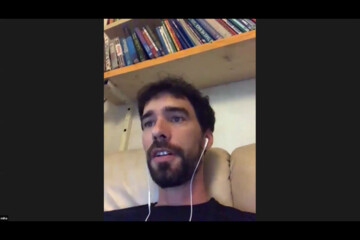Solidarity in transition
The neoliberal revolution has all but buried the language of class struggle. It has expelled commonly used terms such as “labour power”, “union” or “means of production” from our vocabularies, replacing them with “civil society”, “non-government organisation” and “human capital”. Yet despite all this, the term “→ solidarity” – a powerful signifier of working class consciousness if ever there was one – strangely persists in today’s language. It can be found on political campaign posters, protest banners, humanitarian fundraising commercials, and even on the uniforms of professional basketball players. Most recently, I’ve noticed it in the pamphlet for a cultural gentrification project in my municipality.
But the solidarity of today’s neoliberal order holds a different meaning than the solidarity of post-war Keynesian and socialist economies. It survived the historic defeat of the working class that threatened to make it obsolete by taking on new meanings and adapting to the changes in everyday life. As the social bonds created under Fordism and socialist industrialisation were severed, giving way to a service sector economy and privatised social reproduction, people could no longer relate to each other in the same ways. As interpersonal relationships were rearranged to accommodate the new structures and a hyper-individualised view of the world took root, solidarity became less understood as “a union or fellowship arising from common responsibilities and interests, as between members of a group or between classes, peoples, etc.” and became more commonly defined as a “community of feelings, purposes, etc”.[1]
Take for example large scale internationalist projects of the 20th century, from the Communist International to the Non-Aligned Movement, or even Pan-African Alliance. These organisational foundations for an international people’s solidarity have all but crumbled, the Anti-Apartheid struggle perhaps being internationalism’s last breath before the IMF, World Bank, NATO and other capitalist vehicles ushered us into the era of neoliberal internationalism[2]. The language of “people’s solidarity” of course remains intact, but is filled with new meaning, realigned with the interests of the bourgeoisie. Instead of a common struggle for a better world, there is humanitarian aid from the first world to the third. Instead of liberation, there is development. Instead of equality, there is opportunity. Under neoliberalism, solidarity is no longer a political act of coalition building, but an individual’s expression of moral integrity. It is donating to a charity fund for refugees or buying fair trade products. Supporting actual foreign political struggles on the other hand is seen as an extremist and unpatriotic, if not outright criminal venture.
A similar logic applies to working class solidarity on the domestic front. More than three quarters of the population in industrialised states are wage-workers, yet they share very few institutions in common. Unions have seen their membership plummet as service sector work has replaced industrial production, and precarious jobs in the gig economy have replaced full employment. The common housing, social and cultural institutions that working class people used to have some control over have been privatised. Traditional labour parties have made steady steps rightwards and eventually shifted their electoral pitches towards downwardly mobile urban professionals. In their place have come NGOs and various foundations for “poverty reduction”. This too has changed the meaning of solidarity, replacing the common interest of workers with the individual’s rights in the market, replacing workers’ power with workers’ legal rights, replacing group action across sectors with workshops for “marginalised communities”. Solidarity is more than ever an individualised sentiment or an individual show of → empathy, not a sustained act of group organising and coalition building.
This shift reflects the changes in class power and the accompanying political methods of the bourgeoisie. The conditions for working class solidarity have been dismantled. It has been replaced by bourgeois solidarity – solidarity among the owners of capital – and reinterpreted to the working class as representative of their own interests. So trade organisations, financial groups, political parties, NGOs, cultural institutions, professional guilds and the media all lay the foundations for the common interests of the international capitalist classes, while the working class struggles to find any similar footholds. Put simply, solidarity as “a union or fellowship arising from common responsibilities and interests” need real material foundations to take root. Be it the factory, the union, the council home, the commune or the party, it is only organisations grounded in the productive sphere that can serve as a foothold for working class solidarity.
Solidarity’s new home – social reproduction as a field of struggle
What then remains of social institutions which would allow the forging of working class coalitions? In most European countries it comes down to the welfare state and public services, public education, health care and housing – in short: the sphere of social reproduction. There is no need to romanticise these institutions and frame them as some kind of humanist oasis outside the brutal realm of capitalist production. The welfare state is in all ways integral to the capitalist system, as it provides housing, → care (→ care), education and other services necessary for the reproduction of the labour force. It is also in no way owned or controlled by working class people, but is a top-down bureaucratic system, a form of human resource management for the capitalist class.
Nevertheless, it has been the institutions of the welfare state, namely public health and educational services, which have been the terrain of the widest and most diverse working class coalitions in recent years. As capital has sought to recover from various crises by reforming the sphere of social reproduction, turning public services into privatised profit-driven enterprises (or pushing them into the realm of unpaid feminised housework), a wide range of social actors have repeatedly struck back. In Western centres of capital facing deindustrialisation, this process can be traced all the way back to the 1970s, when working class demands were commonly aimed at social services and public welfare programmes, most notably by the Unemployed Worker’s movement, The Industrial Worker’s movement and Welfare Rights movement.[3]
Not only are public service institutions a common ground for articulating working class grievances, but they remain among the few areas of stable unionised employment. Therefore public sector employees such as teachers and postal workers have not only been able to maintain a strong union presence throughout both Europe and the United States, but have also repeatedly inspired wide public support, as people are well aware of how valuable their services are.[4] Even in the heydays of neoliberal privatisation, the British NHS has proven to be untouchable and is widely supported despite its flaws – a sentiment shared with regard to public health institutions in most countries. And let us not forget, the single largest and most diverse coalition of the US working class in decades, the Bernie Sanders presidential campaign, was built around the demand for Medicare for All. So even as the influence of labour organisations in society dwindles, we continue to see mass organising across social lines to defend public services from the implementation of market logic.
This is no coincidence. While most state run programmes can hardly be categorised as public, let alone worker-run projects with any meaningful independence from capitalist production, they have none the less become spaces in which working class interests can coalesce – perhaps filling the gap left by organised industrial labour. As Rastko Močnik argues, changes in the technical composition of labour also rearrange the terrain of class struggle.[5] So while the shift towards a service sector economy dismantled the previously existing organisational capacities, more pressure was put on institutions of social reproduction to keep society running, making them an essential battle ground for different segments of the working class. And while much is left to be discussed around how these institutions should be organised and funded, they appear to offer strategic inroads not only for the working class to gain much needed power, but also a vision of how production could be arranged more generally.
Solidarity in action – decommodification as political strategy
Within cultural institutions, academia, autonomous spaces or religious communities, there is a tendency to experiment in building small scale or temporary versions of the kind of society we would like to envision, acting as a kind of social oasis in the neoliberal terrain we are otherwise trapped in. A similar tendency often arises within protest movements, which have attempted to build alternative collective support mechanisms. And while such efforts are undoubtedly commendable, they are rarely grounded in the productive sphere and thus seem to correspond more with the definition of solidarity as a community of feelings and purposes. Not only is this form of solidarity unsustainable on an institutional level and ultimately frustrating on an individual one, it is also politically inefficient for galvanising real social change.
More often than not, progressive movements that are not grounded in the sphere of production (in working class organisations) lack the capacity to effect political outcomes outside the confines of their own organisations, and in many cases even end up replicating them on the inside (there is no lack of precarious work conditions, racism, sexism or class hierarchies within cultural, academic or activist circles). So it is necessary to redefine solidarity and begin framing it in political terms – to move its meaning from an act of localised individual practices based on moral convictions, towards a pragmatic act of coalition building based on common material interests.
This opens up the field of political strategy. Firstly: what social groups (or on an international level, what governments) with any organisational pull can be brought together to force material concessions from capital? And secondly: what are the demands around which they can be organised? What demands are radical enough to bring about actual change, yet not so radical that they are perceived as unattainable? This kind of strategic thinking is crucial for any kind of advancement – without defining the material interest that can sustain a durable political alliance with actual working class participation, such movements are reduced to groups of professional activists making moral gestures, which can quickly fade into the background of today’s 24-hour news cycle.
From this strategic standpoint, it is clear that teachers and healthcare workers have been among the few organised working class groups which have managed to make any inroads at all into the broader society. Their strikes or political campaigns managed to open spaces for broader discussions on employment, public services, work hours, reproductive work and even climate change. Quoting prominent labour organisers, environmental analyst Matt Huber notes that:
Jane McAlevey has persuasively argued that the healthcare and education sectors should be the strategic target of a new working class union movement. These sectors are the very basis of social reproduction in many communities – and unlike steel plants, they cannot be offshored. Alyssa Battistoni also argues these “social reproduction” or “care” sectors are inherently low-carbon and low-impact sectors. Expanding these sectors should be central to the political ecology focused on “care” in the larger sense of the term (to include ecosystems and other life support systems). Many of these struggles are also in the very public sector that will be crucial to the program of decommodification.[6]
The term decommodification is central. Loosely defined as “the strength of social entitlements and citizens’ degree of immunisation from market dependency”[7] and the “degree to which individual, or families, can uphold a socially acceptable standard of living independently of market participation”,[8] it serves as an ideal framework for a political programme of the working class – radical yet not unattainable. In the era of COVID-19, when the inability of market forces to provide basic goods and services has become abundantly clear, the need to remove social reproduction from the sphere of market circulation simply seems like common sense. If anything, it was the privatisation of these services that was counterintuitive to most people. In many ways, a decommodification of goods and services would simply be a return to normal.
While our current social arrangements still contain examples of decommodified spaces of social reproduction, history also provides many examples of societies attempting to expand or revolutionise these models. In her seminal work Restoration of Capitalism: Repatriarchalisation of Society,[9] Lilijana Burcar has mapped how socialist Yugoslavia’s day-care programmes were intricately tied-in with almost all sectors of society – from the management of the workplace to the city and community itself. Reproductive work was to a large extent professionalised and socialised, providing → mothers not only with access to the workplace and leisure time, but also well-paid union jobs in the care sector. It is only through the privatisation and commodification of nursing homes and the care sector in general that the patriarchal nature of capitalist production has been re-established in force – yet for many working class people the idea of socialised day-care, and even meals and laundry, is far from a utopia. It has already been a lived experience.
Could we then, through a sustained effort, pull more and more services and goods out of the domain of the market and guarantee them as a right? Could we extend the health and educational services provided in most European countries to housing, transport, daycare and food? How could more people be employed in providing these services and what new forms of cooperation and decision-making could this generate? And of course how can these programmes be tailored to fight climate disaster? While propositions for a universal basic income do little to address these questions and maintain an individualised working class with no bargaining power, decommodification of social reproduction presents us with a unique opportunity for both social transformation and pragmatic coalition-building.
But the fact that certain solutions can ring out like common sense does not yet make them a political reality until the organisations needed to fight for them are put in place. As we are recovering from a massive public health crisis, support for publicly funded services has never been greater. Yet there have been little to no moves from governments to expand any kind of funding for healthcare, welfare or education, while on the other hand military and security spending continues to grow. This can be attributed to the weakness of the organisations representing public service workers and the lack of coordination between them, as well as the large structural obstacles these organisations face (everything from EU dictated austerity to local union busting efforts).
Despite all this, one would be hard pressed to find any other force within the working class better positioned to advance a radical agenda than public service workers. Even a minor segment of this sector withholding its labour would present a significant blow to capital and open new pathways forward. And while the organisational task is certainly daunting, few workplaces in today’s economy maintain better organisational conditions than these public sector services. Union density is higher, workers interact more regularly, and workplaces cannot simply be moved abroad. In short, the conditions for solidarity are much better than can be found in other arenas of struggle.
In many ways, the task of creating and moulding these conditions still lies ahead of us, but the sphere of social reproduction is the one where they are most likely to arise, with a programme of decommodification providing a fruitful political framework. And as large-scale interventions into the economy have proven to be not only possible, but necessary, the idea of a public job guarantee set up to maintain the essential work of social reproduction no longer seems a utopian dream, but a pragmatic and politically viable solution. Arguments for such programmes can not only be presented as a credible alternative to the dead end of austerity, but can also be a focus of the organisation. And with organisation comes new meanings and possibilities. As such, a redefinition of solidarity may well present itself to us in the near future.






